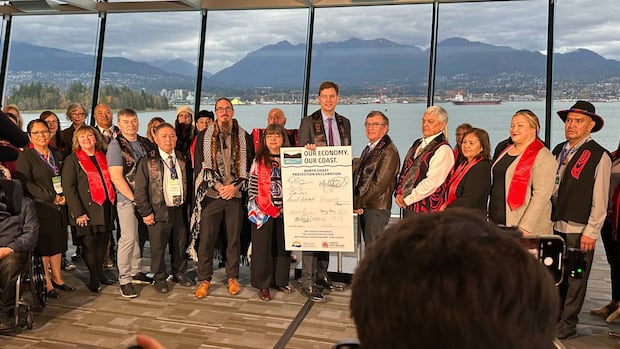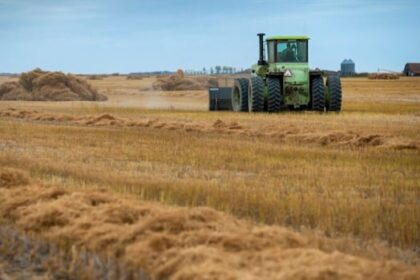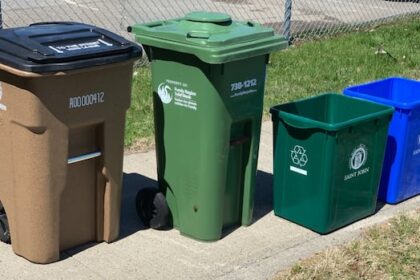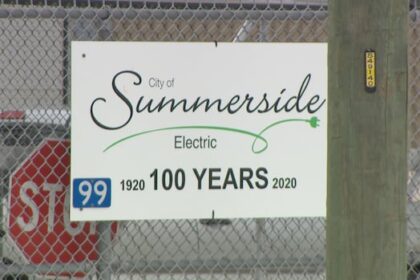British ColumbiaB.C. Premier David Eby stood with members of numerous First Nations from B.C.’s northern coast on Wednesday to support and sign a declaration that asks Ottawa to continue a moratorium on oil tankers in the province’s northern waters. Declaration comes amid Alberta premier’s pipeline push, Ottawa’s effort to fast-track major projectsChad Pawson · CBC News · Posted: Nov 05, 2025 12:12 PM EST | Last Updated: 3 hours agoListen to this articleEstimated 4 minutesB.C. Premier David Eby stands with the leaders from coastal nations after together signing a declaration to protect the province’s North Coast from oil tankers. (Corentin Mittet-Magnan/Radio-Canada)B.C. Premier David Eby stood with members of numerous First Nations from B.C.’s northern coast on Wednesday to support and sign a declaration that asks Ottawa to continue a moratorium on oil tankers in the province’s northern waters.The North Coast Protection Declaration is the latest advocacy by B.C. to urge the federal government to protect the environment and the autonomy of First Nations, as Alberta Premier Danielle Smith pushes for a new private-sector pipeline that would send crude oil to the northern B.C. coast for export to Asia.The declaration says any spill of crude oil in the area would destroy billions of dollars in economic activity along the coast, and result in “generations of lost livelihoods and irreversible ecological damage.”Lifting the ban “makes absolutely no sense,” said Eby.Locals have long emphasized the need to protect the ecological area.“It remains one of the richest and most productive ecoregions on earth,” said Marilyn Slett, president of the Coastal First Nations and elected chief councillor for Heiltsuk First Nation.“We want to continue to live our way of life connected to a healthy, intact ocean.”Eby, Slett and a group of other coastal First Nation leaders signed the declaration together at the 10th B.C. Cabinet and First Nations Leaders’ Gathering in Vancouver.’Supports thousands of livelihoods’The nine-paragraph declaration describes how the North Coast’s environment and economic drivers are linked.“For generations, communities have built and sustained the economy of the North Coast — a legacy that continues today through a multibillion-dollar, sustainable conservation economy that supports thousands of livelihoods in fisheries, tourism, renewable energy and stewardship,” reads the declaration.There’s been a voluntary exclusion zone over the coastal area since 1985, and in 2019, the federal government brought into force its Oil Tanker Moratorium Act, which prohibits oil tankers carrying more than 12,500 metric tons of crude oil or persistent oil to transport it, load or unload it in certain areas of B.C.’s northern waters.Concern that that longstanding protection could come under threat arose this summer when Ottawa introduced its Building Canada Act, which allows the government to fast-track major projects that it deems to be in the national interest, including by sidestepping existing laws.Smith has been calling for the tanker ban to be repealed as part of the Alberta government’s proposal to build an oil pipeline to the B.C. coast.Prime Minister Mark Carney has said the Building Canada Act is a viable and critical way to combat the economic threat of U.S. President Donald Trump’s tariffs on the Canadian economy.The federal government has said that Indigenous people will be consulted during the process of choosing the fast-tracked projects, and that a review process for chosen projects will include further consultations with nations potentially impacted by them.’Driving wedge politics,’ says premierEby on Wednesday highlighted the importance of continuing to protect B.C.’s waters.“We can’t allow the small minority of voices that are driving wedge politics in Alberta to drive the national conversation about what is a uniquely Canadian economy,” said Eby.“This declaration is not a reaction to Alberta, this is a restatement of a consensus that has existed for 50 years along with North Coast.”WATCH | What some nations say about a potential new pipeline in B.C.:Why these pro-development First Nations chiefs support a new pipelineA pro-resource development group of First Nations chiefs is voicing its support for a new pipeline to the West Coast. The founder and president of the National Coalition of Chiefs, Dale Swampy, said oil and gas participation, including ownership opportunities, can be a way to drive economic reconciliation.Some First Nations have expressed support for a new pipeline to B.C.’s coast, saying it could drive economic reconciliation. Signing the declaration, Eby emphasized there is no actual plan for a pipeline, though.“I’ll point out what is obvious to me and has yet to fully sink in for some individuals is that there is no pipeline project across the north, there is no route, there is no proponent, there is no financing,” he said.In a statement, Smith’s press secretary Sam Blackett said they are working hard to find that proponent, referring to Eby as a “parochial premier” who is blocking the export of Alberta’s “most valuable asset.””The decision to build this pipeline lies solely with Prime Minister Mark Carney and the federal government, and we expect him to act decisively and in support of this project,” Blackett said.ABOUT THE AUTHORChad Pawson is a CBC News reporter in Vancouver. Please contact him at chad.pawson@cbc.ca.With files from Edzi’u Loverin and Andrew Kurjata
Friday, 6 Feb 2026
Canada – The Illusion
Search
Have an existing account?
Sign In
© 2022 Foxiz News Network. Ruby Design Company. All Rights Reserved.
You May also Like
- More News:
- history
- Standing Bear Network
- John Gonzalez
- ᐊᔭᐦᑊ ayahp — It happened
- Creation
- Beneath the Water
- Olympic gold medal
- Jim Thorpe
- type O blood
- the bringer of life
- Raven
- Wás’agi
- NoiseCat
- 'Sugarcane'
- The rivers still sing
- ᑲᓂᐸᐏᐟ ᒪᐢᑿ
- ᐅᑳᐤ okâw — We remember
- ᐊᓂᓈᐯᐃᐧᐣ aninâpêwin — Truth
- This is what it means to be human.
- Nokoma











